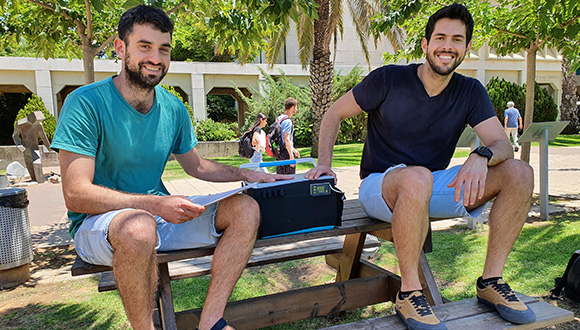Testing the Waters
Students develop portable do-it-yourself lab that checks water quality anywhere in the world
TAU students Amit Porat and Netanel Rachal, bachelor's degree students double-majoring in Mechanical Engineering and Earth Sciences, were looking for inspiration for an impactful final project for their degrees. Meanwhile, Prof. Hadas Mamane, Head of the Environmental Engineering Program and the Water Energy lab at the Faculty of Engineering, was searching for someone to develop a portable device to reliably analyze water samples in remote areas. This, as part of her research initiatives developing sustainable technologies for safe drinking water in developing countries.
The students sat down with Prof. Mamane, who requested the following: "Create a device that can be assembled anywhere in the world at a minimal cost; one that will not depend on the electricity grid and will protect samples by maintaining a constant temperature."
Amit and Netanel got to work, and soon the portable (and very compact) lab for water monitoring was created. The design can be easily replicated without breaking the bank - all its components can be ordered online at a total cost of $86. Or you can find the required parts at a local do-it-yourself store. Oh, and for the sake of comparison, the cheapest industrial model you can buy today will set you back about $900.

Amit, Netanel and the small but mighty portable lab
Who Needs a Portable Water Lab?
Prof. Mamane is the right person to ask, as she regularly monitors water quality as part of her research. She travels with her students to impoverished communities in different parts of the world, mainly in Africa and India, and checks pollution levels. Amit explains that, "All over the world, and particularly in developing countries, there are water quality issues. Some bacteria are harmful, so it is important to check."
Prof. Mamane explains that drinking water contaminated with microbes can transmit diseases such as diarrhea, cholera, dysentery, typhoid and polio. "According to estimates they cause half a million deaths every year, mainly among children. Therefore, it is very important to check the water. In a world of virtual reality, cyber, nanotechnologies and artificial intelligence, children are still dying because their water isn't fit for drinking. This [development] gap is further growing due to the climate change crisis and the cycle of poverty that has worsened since the Corona. We have a moral obligation to face reality on the ground," she stresses.
Amit and Netanel set out to facilitate the monitoring process. For results to be reliable, the water samples must be kept at body temperature (between 36-7 degrees Celsius). "Most places where water samples are collected are off the grid. Electricity or a nearby lab are, at best, a few hours' drive away. The samples need to be transported there the same day. Therefore, a device that will keep the samples at a constant temperature, work independently from the power grid and be able to operate continuously for up to 48 hours is needed," explains Amit.
DIY
The students began to create the device, with the supervision of Prof. Yoram Reich of the School of Mechanical Engineering and project coordinator Danny Barko. Michal Dolev, CEO of Engineers Without Borders, members of which will be using the lab, helped assess the requirements. At her request, the students added the option of mounting a solar panel for self-charging, pockets for equipment, internal compartments in the cooler and more.
The project was not without challenges. In addition to putting together the product itself, the students had to ensure that every part they used was available online or in store anywhere in the world – including developing countries. They spent quite a few hours browsing online shopping sites. "Our goal is to establish local teams that assemble and operate these mobile labs on their own, without the help of Israeli volunteers," explains Amit.
Amit and Netanel also created a user manual explaining how to assemble the kit. "We prepared the instructions in English and included illustrations so that anyone should be able to put it together. We also added a shopping list for the various parts," they explain.

From left: Netanel, Amit, Prof. Hadas Mamane and a visiting professor at the yearly exhibition of the School of Mechanical Engineering
Available for All
"One day, anyone will be able to sample the water, place it in the device, take a picture of the result with their smartphone and send it off for assessment," says Amit.
For now, the users of their kit are mainly volunteer organizations and delegations. This summer, two of Prof. Mamane's student groups went to India and Africa as part of their Developing Countries degree at TAU's School of Social and Policy Studies, and tested the prototype for the first time. "We believe we've done something which can really help, and that's part of the reason why we chose these fields of study," conclude Ami and Netanel.






